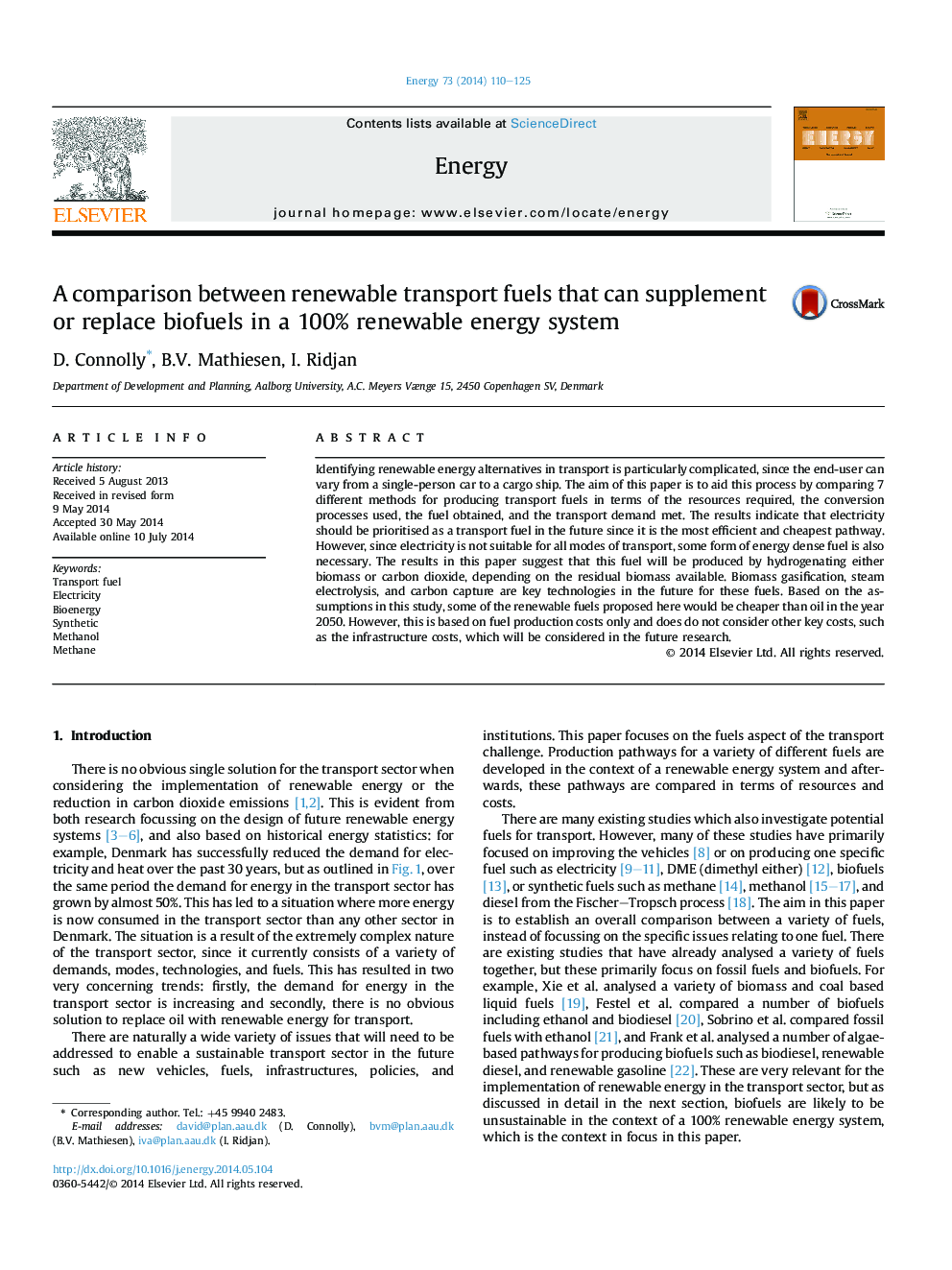| کد مقاله | کد نشریه | سال انتشار | مقاله انگلیسی | نسخه تمام متن |
|---|---|---|---|---|
| 8076972 | 1521473 | 2014 | 16 صفحه PDF | دانلود رایگان |
عنوان انگلیسی مقاله ISI
A comparison between renewable transport fuels that can supplement or replace biofuels in a 100% renewable energy system
ترجمه فارسی عنوان
مقایسه سوخت های تجدید پذیر که می توانند مکمل های سوخت زیستی را در یک سیستم 100٪ انرژی تجدید پذیر جایگزین کنند
دانلود مقاله + سفارش ترجمه
دانلود مقاله ISI انگلیسی
رایگان برای ایرانیان
کلمات کلیدی
سوخت حمل و نقل، برق، بیو انرژی، مصنوعی، متانول، متان،
ترجمه چکیده
جایگزینی انرژی های تجدید پذیر در حمل و نقل بسیار پیچیده است، زیرا کاربر نهایی می تواند از یک ماشین یک نفره به یک کشتی محموله متفاوت باشد. هدف از این مقاله، کمک به این روند با مقایسه 7 روش مختلف برای تولید سوخت حمل و نقل از نظر منابع مورد نیاز، فرایندهای تبدیل، مصرف سوخت و تقاضای حمل و نقل است. نتایج نشان می دهد که برق در آینده باید به عنوان یک منبع حمل و نقل در اولویت قرار گیرد؛ زیرا این مسیر کارآمد و ارزان ترین است. با این حال، از آنجا که برق مناسب برای تمام وسایل حمل و نقل نیست، برخی از انواع سوخت انرژی انبوه نیز ضروری است. نتایج حاصل از این مقاله نشان می دهد که این سوخت توسط هیدروژنه کردن زیست توده یا دی اکسید کربن، بسته به نوع موجود در زیست توده باقی مانده تولید می شود. گازسیون زیست توده، الکترولیز بخار و جذب کربن فناوری های کلیدی در آینده برای این سوخت ها هستند. بر اساس مفروضات این مطالعه، برخی از سوخت های تجدیدپذیر که در سال 2050 پیشنهاد شده اند ارزان تر از نفت خواهند بود. با این حال، این فقط بر هزینه های تولید سوخت مبتنی است و سایر هزینه های کلیدی مانند هزینه های زیربنایی، که در تحقیقات آینده در نظر گرفته خواهد شد.
موضوعات مرتبط
مهندسی و علوم پایه
مهندسی انرژی
انرژی (عمومی)
چکیده انگلیسی
Identifying renewable energy alternatives in transport is particularly complicated, since the end-user can vary from a single-person car to a cargo ship. The aim of this paper is to aid this process by comparing 7 different methods for producing transport fuels in terms of the resources required, the conversion processes used, the fuel obtained, and the transport demand met. The results indicate that electricity should be prioritised as a transport fuel in the future since it is the most efficient and cheapest pathway. However, since electricity is not suitable for all modes of transport, some form of energy dense fuel is also necessary. The results in this paper suggest that this fuel will be produced by hydrogenating either biomass or carbon dioxide, depending on the residual biomass available. Biomass gasification, steam electrolysis, and carbon capture are key technologies in the future for these fuels. Based on the assumptions in this study, some of the renewable fuels proposed here would be cheaper than oil in the year 2050. However, this is based on fuel production costs only and does do not consider other key costs, such as the infrastructure costs, which will be considered in the future research.
ناشر
Database: Elsevier - ScienceDirect (ساینس دایرکت)
Journal: Energy - Volume 73, 14 August 2014, Pages 110-125
Journal: Energy - Volume 73, 14 August 2014, Pages 110-125
نویسندگان
D. Connolly, B.V. Mathiesen, I. Ridjan,
